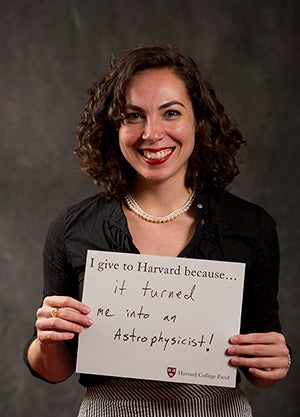 Erika Hamden ’06 may have been preparing to defend her doctoral thesis in astronomy and astrophysics at Columbia University, but that didn’t prevent her from volunteering for Harvard.
Erika Hamden ’06 may have been preparing to defend her doctoral thesis in astronomy and astrophysics at Columbia University, but that didn’t prevent her from volunteering for Harvard.
As participation chair for the Class of 2006 Gift Committee, Hamden recruited 20 volunteers, all of whom she corresponded with on a regular basis. She also drafted personalized appeals to classmates.
“Email makes things easy, and if you customize your note, classmates respond. People value being spoken to as individuals,” says Hamden.
She draws great pleasure from connecting with classmates—those she knew at the College and those she is just meeting now. “It’s a nice excuse to keep in touch, and it’s always very satisfying to have someone make a gift,” she says. “When I talk to people about why they should volunteer, I remind them of their influence. Peer-to-peer solicitation is so easy and so effective.”
Supporting financial aid was one of the reasons Hamden first decided to volunteer for Harvard, as part of her class’s Senior Gift Committee.
“I met so many interesting and different people while at Harvard, and it was because the student body was so incredible. I want to make sure that all future classes are like this.”
While at Harvard, Hamden lived at Eliot House, earned a letter on the field hockey team, and started the Eliot House Wine Society while working at L. A. Burdick Chocolate.
“My time at Harvard gave me the friends I have today and set me on my path for my career,” she says. Although she liked astronomy when she arrived at Harvard, Hamden wasn’t sure where it would take her. But the chance to work in the Center for Astrophysics cemented her interest in the field. She went on to research galactic dust clouds, detector technology, and ultraviolet instrumentation, and to pursue her PhD.
Hamden recently accepted a postdoctoral research position at Caltech, funded by the National Science Foundation, and is working on two projects: an ultraviolet telescope for a high-altitude weather balloon and a spectrograph that will be installed at the W. M. Keck Observatory in Hawaii.
“I appreciate Harvard so much now as a working scientist,” she says. “It makes me really appreciate the resources Harvard has and how well run the College is. It’s easy to do smart science there.”